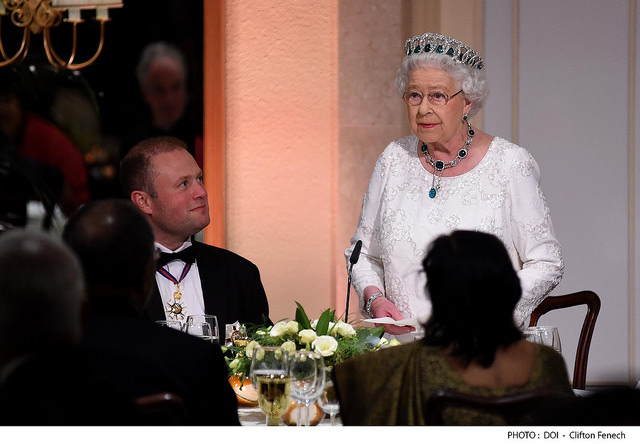By Dr Eva Namusoke, Postdoctoral Research Officer, Institute of Commonwealth Studies
While the interviews in the Commonwealth Oral History Project (COHP) offer a range of opinions and experiences covering decades and crossing continents, there is one issue that virtually all the informants agreed on: the importance of Queen Elizabeth II as Head of the Commonwealth. When she ascended the throne on 6 February 1952, Queen Elizabeth also became ‘Head of the Commonwealth and Defender of the Faith.’ The 64th anniversary of that event was marked this year with gun salutes in London’s Green Park and at the Tower of London. The Commonwealth of 1952 looked very different to that of today and in fact the modern Commonwealth as we know it was less than 3 years old on Queen Elizabeth’s accession. Over the past 64 years, states have declared their independence, joined the Commonwealth and left the Commonwealth; there have been numerous changes in leadership, coups, conflict and huge development across the now 53 member states. In her reign Queen Elizabeth has made over 200 visits to Commonwealth countries, visiting all but Rwanda and Cameroun and been present at every Commonwealth Heads of Government Meeting (CHOGM) (apart from Sri Lanka in 2013) since 1973. As former Secretary General Sir Don McKinnon (2000-2008) commented, ‘She is the unchanging element, the permanent element, that is there all the time.’

HM Queen Elizabeth II speaks during banquet at 2015 CHOGM, with Prime Minister of Malta Joseph Musca.
CHOGM Malta 2015 photo byClifton Fenech
With her longevity as Head of the Commonwealth and role as the almost only constant in the organisation’s 67 year history, there is a strong appreciation for Queen Elizabeth amongst many of those interviewed for the COHP. This is particularly interesting considering the decidedly republican leanings of many of those interviewed. As Max Gayland, an Australian diplomat who was Director of Political Affairs at the Commonwealth Secretariat from 1988-96 noted: ‘You have to laugh: some of the most leftist politicians in the world – particularly [from the] Caribbean and sometimes Australia and New Zealand – they love going and meeting this Head of the Commonwealth.’
The interviews are peppered with anecdotes about visits with Her Majesty, her ‘genuine interest’ in Commonwealth affairs and her status as a unifying ‘symbol’ – the exact term many use – for an organisation with such vast cultural, political and economic differences. David McDowell, a New Zealander who was Special Assistant to the Commonwealth Secretary-General, Arnold Smith from 1969-72 discussed the Queen’s ability to engage with Commonwealth matters:
‘Instinctively, I suppose I’m a republican, but I’m a great fan of the Queen as Head of the Association, as Head of the Commonwealth. We used to go and brief her twice a year – Arnold [Smith] and I, or Emeka [Anyaoku] and Arnold, or whoever was around – and she would go right through the list of people. You know, not with notes; I mean, right off the top of her head. She would ask, “How is Dr Banda?”, “What’s the internal situation now in Zambia?”, or, “What do we think about developments in India?” And she had a compendious knowledge, particularly of the Commonwealth leaders. She knew them all and she was fascinated.’
Sir Ronald Sanders, a Guyanese member of the Commonwealth Eminent Persons Group from 2010-2011 commented on the Queen’s tradition of meeting heads of government in person at various CHOGMs, and the lasting impression she made: ‘I do not know a single one of them who has not been delighted to accept her invitation, who has not been absolutely charmed by her, has not been fascinated by the breadth of her knowledge and has not left her company glad that she’s the Head of the Commonwealth.’
